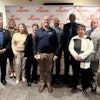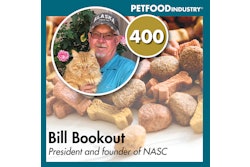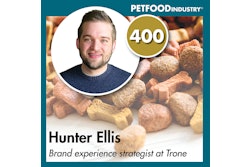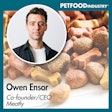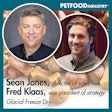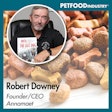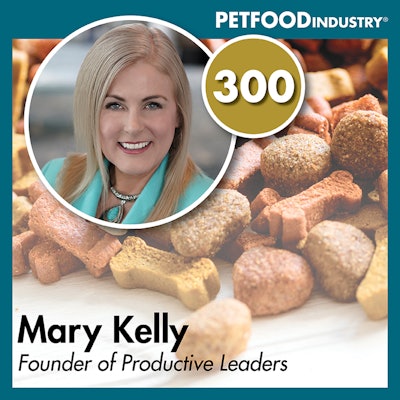
Leadership is a complex concept at the best of times, so how does it need to evolve during challenging times? If you're looking to take your leadership skills to the next level, tune in to the conversation I had with Founder of Productive Leaders, economist, and leadership expert Mary Kelly, Ph.D. about what successful leadership should look like today.
The below transcript is from Episode 29 of the Trending: Pet Food podcast, where I spoke with Founder of Productive Leaders, economist, and leadership expert Mary Kelly about the challenges of leadership in the current global landscape. You can find the episode at www.PetfoodIndustry.com/trending-pet-food-podcast, on SoundCloud or on your favorite podcast platform. This episode originally aired on March 1, 2023.
(We want to thank AFB international for sponsoring this podcast. AFB is the premier supplier of palatants to pet food companies worldwide, offering off-the-shelf and custom solutions that make pet food, treats and supplements taste great.)
Lindsay Beaton – Editor, Petfood Industry magazine and Host, Trending: Pet Food podcast Hello, and welcome to Trending: Pet Food, the industry podcast where we cover all the latest hot topics and trends in pet food. I’m your host and editor of Petfood Industry magazine Lindsay Beaton, and I’m here today with Mary Kelly, Ph.D., founder of Productive Leaders.
Hi, Mary, and welcome!
Mary Kelly – Founder, Productive Leaders
Hi Lindsay, it's so exciting to be with you today.
Beaton: In case you've not had the pleasure of crossing paths with Mary Kelly, here's what you need to know. She is an internationally known economist and leadership expert specializing in the fields of leadership, organizational change, productivity, communication and business profit growth. She is a retired U.S. Navy Commander with master’s degrees in history and economics and a Ph.D. in economics. Mary has extensive experience in business coaching, management, economics, finance, banking, insurance, real estate, government, organizational leadership, communication, business growth, teamwork, strategic planning, human resources, customer service, time management and project development. Finally, she’s the author of 15 books about business and economics.
Mary Kelly is one of our keynote speakers at Petfood Forum 2023, being held at the beginning of May, and she’ll be speaking on “Futurenomics: Turning crisis into clarity for your team and organization,” which will provide an economic snapshot of all the current issues affecting the economy and pet food businesses. This, alongside her extensive resume and experience with leadership in all aspects, is why I’ve brought her on today to answer this question: What does successful leadership look like through difficult times?
And I want to start our conversation by widening the lens a little bit and talking about leadership in general. What do you think, in general, makes a great business leader?
Kelly: Such a great question, Lindsay. And as you were reading all of the lovely notes in the bio, which came from all these articles and books that I get to write on, everything is under the umbrella of leadership. And in the past few years, leaders have had to adapt and figure out new ways of doing things that some people struggled with and some people kind of sailed through. Some experienced leaders you thought would have sailed through very nicely, other brand-new leaders seemed to do better than people expected. A part of this is, when we look at the spectrum of leadership today, especially in the pet food industry, what are we expecting of our leaders? What do we want our leaders to be doing? What do we want them to be thinking about? And I think that's a deeper question, is where do we want our leaders to be spending their big thinking, big time, big experience on the future of where we're going?
Beaton: When you say “we” are you talking about people within the organizations under that leadership? Or is it more of a societal movement at large?
Kelly: For example, in the pet food world, it’s “we” your employees, “we” your audience, “we” your peers, “we” your suppliers, your partners. We're looking at leaders in various components, and we're looking for answers.
Beaton: And it's interesting that you talked about leadership being a spectrum. What parts of the spectrum have you seen people having an easier time with what leadership is needed currently, versus who's having to do a little bit more work to adapt to what we need today?
Kelly: I think people who like the status quo have really struggled because their status quo is gone. And under the guise of leadership — and it's one of the things I'm going to share with the audience in Kansas City — I like to taxonomize the world in general; that makes sense in my brain when I can put things in a category. So I look at all the problems in the world that are geopolitical in nature: You know, Russia is in Ukraine, and Syria and Turkey had this big earthquake, and China thinks they're going to take over Taiwan. Okay, well, hang on. I just want to make pet food. How does that impact me? Well, it does, because we are a global presence and instability in Ukraine impacts shipping in Europe and impacted shipping in Europe is going to give rise to higher prices if we have to go through different routes. So geopolitical issues do impact what it is we need to do.
Then I look at economic issues and it's everything globally: Taxes, inflation, interest rates, money supply, what value currencies are, all the economic issues that people are struggling with. And then I look at workplace issues, things that my managers and leaders are struggling with on a day-to-day basis: The idea of people showing up to work and not being engaged, people openly being disengaged, which is actually sabotaging some companies. Gallup just came out with a survey on this. This idea of quiet quitting, where people just decide to show up and not work very hard but not enough to actually get fired. Okay, hang on, that's an accountability issue, which is also a leadership issue. So there's all these workplace issues.
And then there's domestic issues, which some people are worried about, you know: The ESGs, and crime, and violence and social justice, and sidewalks and potholes, all of these things are preying on people in ways that are unprecedented, because we've just never seen all this. Oh, and then slap on top of all of that this big filter of “global pandemic, oh, you could die.” And this has created stresses and elevated cortisol levels, basically, on a global scale.
So because of that leaders and managers have had to figure out ways to handle it themselves, which is: “How am I managing what I've got to deal with? But also, how do I help my people, as a leader and manager, deal with unprecedented levels of stress, because we're dealing with unprecedented levels of crisis/challenge/change?” So that’s a very long answer to a very short question.
Beaton: But it's also a very complete answer. And people are just trying to make — you know, in this industry, specifically, and in every industry, people are just trying to do what that industry is trying to accomplish. And now as leaders within a business setting, not to mention as people in a society setting, we are all dealing with so much right now. Nobody is equipped for this. Nobody was prepared for any of this, and what's going on right now, how do people who want to be good leaders deal with this? What do they focus on? Because they cannot solve everything; none of us can solve everything. We're all just trying to get through the day.
So what is it that they have a responsibility to focus on, to their business and to their employees, versus things that they should acknowledge and be aware of but maybe not necessarily try to address because it's just out of their scope, there's not enough time and they don't have the expertise? And it's just not — a business setting is not the place to handle that kind of thing?
Kelly: Right. So, some of my leaders really struggled and some are still struggling, others not. And I was on calls, like you were in the very beginning of all this — men, women, they're crying, my business, my people, all this big drama. And partly, it's probably because I spent 26 years on active duty in the Navy, and partly because I'm used to dealing with crazy situations and fast-moving things, and partly I was raised by Irish Catholic parents where “Why are you crying, I'll give you something to cry about,” was their attitude. But for some people, we looked really quickly at the first four stages of a crisis/challenge/change, which I'm going to diagram out for the folks in Kansas City. And then many people stayed in the first four stages of a crisis/challenge/change. It's very myopic and it's very understandable. It's: Protect me, my job, my kids, my school, my homeschooling, my components, my pet food world, and I just can't look externally because I can only control what I can control. And I agree with that. If you're trying to not be stressed out about the entire universe imploding, you need to focus on what you can control.
Where we have a problem is when people start focusing on things that they have no influence over [and that] have no bearing on their day-to-day lives. I didn't like who won the Grammys. Okay, you can't really change that by getting into an argument on Facebook. I didn't like who got elected. Okay, you're going to change that with an argument on Facebook? Good try on that one, too. So people sometimes, because their lives were so stressed out anyway, they looked for releases for anger. Sometimes that happened at work, sometimes it happened on social media, sometimes it happened in their neighborhood. But all of it stems from the fact that they are not able to circle the wagons and control what they can control. They felt this sense of “out of control.” And we know that in any stressful situation, action trumps fear. If you can take action and move forward, then people will suddenly realize, “That's what I have to do.”
In order to get ahead, take two steps forward in the right direction — the right direction, that part's important. That's where leadership and good management comes from. What happened, though, is a lot of managers and leaders … instead of leading, they did nothing. So there's the “fight-or-flight” which we're all familiar with. But there's also “freeze,” just like deer in the headlights when you're driving down the country road and the deer gets in the middle of the road, always the middle of the road, stops and stares at you. A lot of leaders did that. And some of them are still doing that. They did not get into stages five and six. Stage five is the new reality, very quickly assessing the situational issues, having a great element of situational awareness, and being able to translate that into stage six, which are the Great Realignment questions which are all externally focused.
And that's the big difference. Great leaders are externally focused. They're not worried about their own job, their own career, their own whatever. They are looking to serve others, and that is a critical element. And then in the Great Realignment, I map out what that actually looks like for leaders. And then I challenge leaders: I say, “Look, if you just pick one of these realignment issues that will give you the greatest ROI in your part of our business, what would that look like? How does that manifest, where you're going to get greater revenue, greater profitability, greater market share, greater sales, whatever you want greater of? What would that do for you?” So it's designed to be this understanding, hey, some people are still stuck here. Here's how you move into stages five and six; you may have been in those first four stages. Here's how you migrated into this and here's what you do about it.
Beaton: So let's say you're listening to this podcast and you're hearing a little bit of yourself in the frozen in stages [part]. Maybe you feel like you're floundering. Maybe you just want to know if you're doing what you're supposed to be doing as a leader these days. In your experience, is it more of a singular internal process? Or is this a situation where it's time to bring in your directors, bring in the rest of the C Suite, have a “come to Jesus” moment, bring in an external source? Who can help evaluate you, what is the best way to go about figuring out if you're where you need to be?
Kelly: I'm giving people metrics of this in Kansas City. We are all getting the 12-month Business Success and Accountability Planner, which is going to help people get a snapshot of where they are. One of the tools I use in that, for example, is I talk to my leaders, I say, “Hey, what are your top five goals for the month?” Well, most of my leaders say, oh, I want this, I want this, I want this, I want this. I want this. They've got it. They know what they are. I said, “Great. Do people know what your top five goals are?” And then they're like, wait, what? Well, how can your people possibly be expected to support you if they don't know where you're going, and if they don't know what you want, and if they don't know what's expected of them? You may be crystal clear. But if your people aren't crystal clear, then we've got some inefficiencies built into the system. So number one, we're going to use that.
Number two, everybody's going to get the Leaders Blind Spot Assessment. I love this tool, because it takes about 90 seconds, sometimes two minutes if you're really thinking hard, and I developed this tool to help predominantly my senior executives. And because I do a lot of work with left brain thinkers, lots of linear thinkers, physicians, I needed something for my physicians. And if you are part of the medical world or part of your family is, you know that some medical professionals do not have long attention spans. Some of my physicians, I tell them with all love, you're like toddlers on a peach monster drink before breakfast. And so I need you to do this quick assessment, it's going to identify your superpowers. But then it's also going to say, “Hey, here's where you might want to pay some attention. Head’s up.” So I love that because it's a bit of a mirror, and we're going to assess that.
And then using number three to answer your question is in the realignment phase, there are a series of questions as well as five-minute tools. So the five-minute solutions are designed to be a one-page solution to a common problem. Is it going to cover every single thing? No. Is it going to hit 90% of about 80 common problems? Yes. There are 80 of these different five-minute solutions, and we're going to cover things like employee engagement, employee morale, leadership improvement, leadership focus, because focus is a big issue right now. Some of my leaders are having trouble focusing, I've got some exercises for them that can help them focus. Some of my senior execs are having a hard time focusing.
And all of my leaders in the past few years have said, “Mary, I'm just tired. I'm just really, really tired. I am worn out. Everybody keeps saying I have to do more of this and more of this and more of this. And I don't have any more to give.” Totally understand that. In the 12-month planner there's a section of what do you want to do more of but, more importantly, what do you need to do less of? What can you outsource? What can you delegate? Even if you don't have anybody on your team, who can you outsource to? There are great global services out there for virtual assistant-type things, all the Upwork and Fibre [options]. And all of those are great, too. But how do you get something dedicated to you, or someone or some service so that you can start taking things off your plate, so that you can regain that sense of focus and calm and confidence that you need in order to do your job really well?
Because at the end of the day, we want to create a great product to make happy pets. That's it. That's what we want. And everything else kind of gets in the way of that. So if we can all go back to our initial purpose — “we got into this because” — and we're reminded of that, it helps a lot. So once we take the things we can control … and some things you can't control all parts of, either. [Like] in a relationship: Yeah, there's other people. That can be 50% you can control. Well, you can control 50%. You kind of have to map out where I can make a difference, where I can make the best difference, and then figure it out from there. And then focus again on the things you can control, because if you let everything going on in the world get inside your brain, you'll be a stressed out insomniac who can't get to sleep. If you can't get to sleep, you're waking up at three o'clock in the morning with every unresolved issue you've ever had since you were five years old, and you're miserable. So we've got to get back to doing what we know we are great at, we have to get back to figuring out what our teams are best at. More importantly, we have to help the people around us and ourselves stay laser-focused on our mission or vision and our goals.
Beaton: We've talked a lot about the challenges, of which there are many. What are some of the successes you've seen in the last few years, be it specific models for leadership right now that you're seeing or following, or just traits in a leader right now? I'm assuming that self-awareness and flexibility are probably two of the things that are getting people through right now. But what are some of the big things that make for successful leadership right now?
Kelly: Helping other people do well. It's very much a coach mindset. Are you coach-able, but are you coachable? Or can you yourself be coached up? And can you coach other people? And by that, it's helping people be successful? And you did that. You're a great example of that: For example, last week, we're like, we're still on for next week, right? “Yes.” Today, we're still doing this, right? “Yes.” Great reminders of hey, we're still going to do this, making sure that everything is focused where it needs to be, helping people be more successful by giving them more reminders than they might need. We're seeing that.
I'm also seeing more leaders ask better questions. And I did this when I had command in the Navy. I would walk around and I was guilty of this: “How you doing?” You know what I got? “Good, great, fine.” It didn't tell me anything. And you know, part of me was like, “Well, everybody's telling me things are great. So they must be great.” Wrong. Good, great, fine doesn't tell you anything about what's actually going on in your organization or with that person. Those are two separate questions. So I like to invite people to take it a different way. If you're going to lead, first off you need to lead individuals, not demographics. You don't lead a remote work team, you lead an individual person who happens to be working in St. Louis. And you ask a question. “So Lindsay, on a scale of 1 to 10 — with one being ‘pretty darn bad and you should maybe keep me away from tall buildings and bridges’ and 10 being ‘absolutely fantastic, couldn't be better, slept great, last night woke up with the dog, had a great day, had a great breakfast, all my coffee’s in order, my world is perfect’ — you know, how are you doing with everything going on today? Where are you?” And if Lindsay says, “I'm about an eight.” Okay, Lindsay’s all right. “Lindsay, what would take you to a nine?” Lunch? Okay, that's Lindsay's big issue. I'm not worried about Lindsay today. But if Lindsay says, “I'm about a three,” whoa, I'll stop. That means my whole world stops right now. “Hey Lindsay, it sounds like there's some stuff going on. Is there anything you want to talk about?” Or “Hey, I know there's been a lot of challenges going on. What's going on in your division, your department, your whatever that might be getting inside your head?” Ask the questions so that you're getting real answers. Is it nice to get good, great, fine? Yeah, you know, but that doesn't help you be a leader at all.
So I'm seeing my leaders become more caring leaders because they have to be, they are more empathetic leaders. It doesn't mean I'm solving all your problems and it doesn't mean I'm letting you skate by without doing your job. It means I'm going to help you with my experience, the resources I know we have; it means I'm going to help you talk through what's going on and find some solutions. And I need to let you know you're not out there by yourself, that there's a whole team of people here. And maybe I'm not the best person. Maybe Charlie is a better person to talk to, maybe Mary Beth is a better person to talk to. But I'm going to make sure that we put things in place so that you are able to get out of this not-so-great place you might be in. Or it might be something personal: Well, I'm taking care of an aging parent, lots of my friends are and they were up all night which meant I was up all night, and I had to fly back and mom is in the hospital again. And this, that and then the kids … could be just a lot of personal things where people are struggling. Okay, so how can we best support you during this time? It doesn't mean you have to solve all their problems. It means you have to step up as a leader and be better. And when my leaders are tired, that's hard. So I'm seeing more caring leadership, more involved leadership, more genuine leadership, I'm seeing more leaders who are not content with good, great, fine.
Beaton: How much of that shift is circumstantial, like everything that's been going on in the world foreseeing this kind of change, and how much of it do you think is generational? Millennials and Gen Z now entering the workforce, and just having different ideas of what a good leader is and who they're willing to follow?
Kelly: I get asked that a lot. So I think the last few years accelerated the way we're going anyway. And I gotta tell you, I'm so used to dealing with young people. I was a college professor for 30 years, and you got to remember that the average age on board one of my aircraft carriers is 19-and-a-half years old. And the 19-and-a-half year-olds from 30 years ago are the same as the 19-and-a-half year-olds today. They're focused on them, their outcomes, what they want. And as leaders, we had to work that out 30 years ago, too.
So again, some of it is what the workplace is allowing us to do as a positive change moving forward. Some of it is we've got to have better context. I think a lot of leaders — because you have to remember we had an unprecedented 10-year economic growth going into 2020. Frankly, it was easy to make money [and] leaders got lazy. We can't be lazy anymore. We can't be complacent; we have to be better. So I'm not sure if it's generationally driven or circumstantially driven, or if it's just a time has come and now we had to hit the accelerate button. But it's where we are, and people who are not willing to move forward as leaders will not be in those jobs in the future.
I think people need to understand that on the world scale love for pets has never been higher. Love for our animals is huge. We are recording this the day after the Super Bowl and the top two rated Super Bowl ads, guess what, featured dogs. Yes, there are some other interesting ones, but everybody overwhelmingly loved the dog commercials. And this is global. People who are not willing to give money to refugees in Ukraine will give money to help the dogs and cats of Ukraine. It is a very, very interesting shift, partly because on some level, again, when stressed out people look toward who is not going to disappoint them. Yeah, who is not going to disappoint you? Your dog. Who's not going to surprise you? The cat. People can be disappointing, people can surprise you, people can fail you. My dogs are always happy to see me even when I'm ugly, even when I'm having a bad day, even when I'm feeling cranky, even when I'm not lovable to myself. My dogs love me all the time. And we have to understand that there is a greater responsibility now, in the pet food world.
Because of this, people like us are demanding more. We are demanding healthier options, we are demanding cleaner processing, we are looking toward long-term issues with our pets. You ask the average person, “Would you rather spend a day working with your co-workers or a day with your dog?” And you know what people tell me? Not a surprise. So we have this huge responsibility because for many people, and you've heard it, their dogs saved them during a few years of being quarantined. Their animals saved their lives; animals are lifting people out of depression in a way that people cannot. So this puts greater responsibility on us to produce great products. And across all sectors — and it doesn't matter if we are in the pet food industry, or if we run a hotel, or if we run a computer service. Across all sectors, what people want is a good quality product. They want their interactions with people to be pleasant, the buying process, the shipping process, all of that, the reliability aspect, and they want the process to be easy. So if we can just focus on that — and it sounds very basic. Good-quality product, pleasant interactions with people and an easy process for them to pay us. That's pretty easy. So let's do that.
We're just like our dogs and cats. (Well, sometimes cats.) We respond to incentives. So we need to treat our people the way we treat our animals — our good, well-cared-for animals — and that is with positive affirmations, positive rewards and positive incentives. And paradoxically, we don't do that. Paradoxically, you know what we do at work? If we find somebody who's a great, great worker, we give them more work instead of giving them a reward, instead of giving them treats. And you know what, when my dog does the right thing, I shake the box of little treats and the dogs come running because they know what's going to happen next. And yeah, we do it with people. We shake the box of treats and then we're like “ha, here's more work,” and we smack them in the nose. It's not right. So again, one of the points I'm going to make is if we just treated our people the way we treat our very spoiled and well-cared-for animals, we'd actually get better out of our people.
Beaton: Well, I really appreciate you coming on to talk about all of this, because leadership is one of those words that gets thrown around a lot. But it's a lot harder, I think, to pin down what it actually means and what a productive conversation around the idea of leadership would look like, especially in the current business landscape, with so much stuff going on that you can't control, that maybe you should be trying to control, maybe you should just let go. And just the human dynamic is always going to make leadership a complex prospect. So I really appreciate you coming on and trying to help decode some of that ahead of your talk at Petfood Forum. Before we go, I want to do a little plug. Where can people find more information about you? How can they get ahold of you?
Kelly: I am at www.productiveleaders.com/podcast. They will get a preview of some of the materials we will be using in Kansas City, totally free. Everybody in Kansas City is also going to get an electronic vault of resources. If anybody's got a question between now and then, I’m at [email protected]. And I would love questions or insights or anything. If you say, hey, you know, I'd like to talk to you more about this before Kansas City, I would love to have that conversation.
Beaton: Awesome. And once more, Mary Kelly will be speaking on “Futurenomics: Turning crisis into clarity for your team and organization” as our Wednesday keynote at Petfood Forum 2023 being held May 1–3 in Kansas City, Missouri. Hopefully we'll see you there!
That is it for this episode of Trending: Pet Food. You can find us on www.PetfoodIndustry.com, SoundCloud or your favorite podcast platform. You can also follow us on Instagram @trendingpetfoodpodcast. And if you want to chat or have any feedback, I'd love to hear from you. Feel free to drop me an email: [email protected]. And of course, thanks again to our sponsor AFB International, the premier supplier of palatants to pet food companies worldwide offering off-the-shelf and custom solutions that make pet food, treats and supplements taste great. Once again, I'm Lindsay Beaton, your host and Editor of Petfood Industry magazine, and we'll talk to you next time. Thanks for tuning in!

